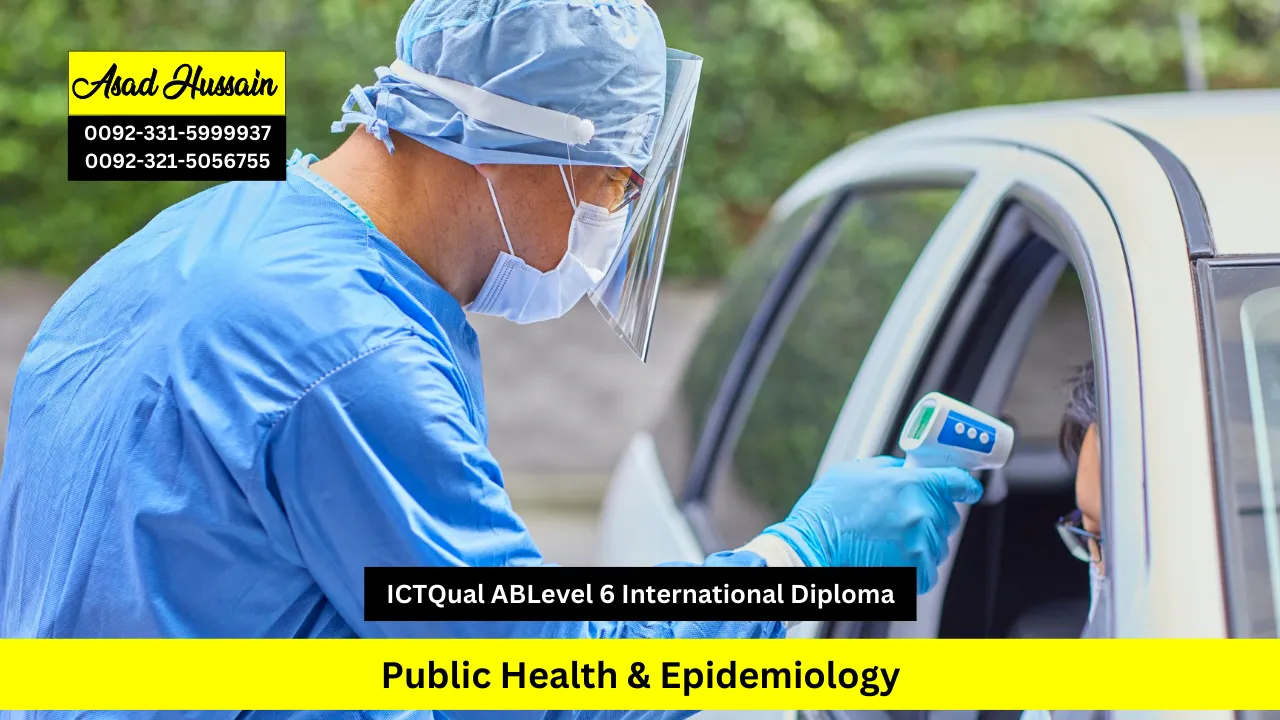Public health and epidemiology are critical disciplines that safeguard communities, inform policy, and drive evidence-based healthcare interventions worldwide. The ICTQual AB Level 6 International Diploma in Public Health & Epidemiology is designed to equip learners with advanced knowledge, analytical skills, and practical expertise to understand disease patterns, implement public health strategies, and manage population health initiatives effectively.
ICTQual AB Level 6 International Diploma in Public Health & Epidemiology covers key areas such as epidemiological methods, health data analysis, disease prevention strategies, environmental and social determinants of health, health promotion, and outbreak management. Learners will gain practical experience in data interpretation, research methodologies, risk assessment, and the design of public health interventions. Through case studies, real-world projects, and applied learning, participants will be prepared to respond to contemporary health challenges with confidence and competence.
Graduates of ICTQual AB Level 6 International Diploma in Public Health & Epidemiology will be well-positioned to pursue careers in governmental health departments, research institutions, non-governmental organizations, and international health agencies. They will develop skills in public health policy, program evaluation, and community health planning, enabling them to contribute meaningfully to improving health outcomes and shaping evidence-based public health strategies globally. ICTQual AB Level 6 International Diploma in Public Health & Epidemiologyalso provides a strong foundation for further postgraduate study in public health, epidemiology, or related healthcare disciplines.
Program Highlights
Study Units
Year 1: Foundation in Public Health & Epidemiology
- Introduction to Public Health
- Fundamentals of Epidemiology
- Human Anatomy and Physiology for Public Health
- Biostatistics and Health Data Analysis
- Principles of Microbiology and Infection Control
- Health Promotion and Disease Prevention
- Nutrition and Community Health
- Environmental Health and Sustainability
- Health Policy and Systems Overview
- Communication Skills for Health Professionals
- Ethics and Professional Conduct in Public Health
- Introduction to Research Methods in Health Sciences
Year 2: Intermediate Public Health Applications
- Advanced Epidemiology and Study Design
- Infectious Disease Control and Prevention
- Non-Communicable Diseases and Chronic Care Management
- Global Health Issues and Health Systems
- Health Economics and Policy Implementation
- Public Health Surveillance and Monitoring
- Occupational and Environmental Health
- Community Health Assessment and Planning
- Health Informatics and Digital Health Systems
- Programme Evaluation and Impact Assessment
- Leadership and Teamwork in Public Health
- Applied Research Methods in Epidemiology
Year 3: Advanced Specialisation and Professional Application
- Advanced Public Health Interventions
- Clinical Epidemiology and Evidence-Based Practice
- Health Risk Assessment and Management
- Biostatistics for Advanced Research
- Global Health Policy and Strategy Development
- Emergency Preparedness and Disaster Management
- Maternal and Child Health Epidemiology
- Advanced Communicable Disease Control
- Health Communication and Advocacy
- Quality Improvement and Risk Management in Healthcare
- Capstone Research Project / Dissertation
- Professional Practice and Field Placement
Applicants should fulfill the specified entry requirements to ensure they possess the foundational knowledge, academic preparedness, and professional aptitude necessary for advanced study in public health and epidemiology. Meeting these requirements helps learners successfully engage with the rigorous curriculum, acquire critical analytical and research skills, and apply evidence-based methods to address contemporary public health challenges effectively.
Age Requirements
- Applicants should be at least 18 years of age.
- Mature applicants with relevant professional experience may also be considered.
Educational Requirements
- A minimum of a high school diploma or equivalent qualification is required.
- Holders of related diplomas in healthcare, life sciences, or social sciences are highly encouraged to apply.
Professional Experience
- Candidates with experience in healthcare, community health, or research sectors will have an added advantage.
- Experience in public health programs, epidemiological studies, or health data management is beneficial but not mandatory.
English Language Proficiency
- Proficiency in English is required for effective participation in lectures, assignments, and research projects.
- IELTS, TOEFL, or equivalent certification may be requested for non-native English speakers.
The ICTQual AB Level 6 International Diploma in Public Health & Epidemiology equips learners with advanced theoretical knowledge, research capabilities, and practical skills to address public health challenges, implement epidemiological studies, and design effective health interventions. Graduates will gain expertise to work in hospitals, research institutions, NGOs, and public health organizations, contributing to health promotion, disease prevention, and policy development.
Year 1: Foundation in Public Health & Epidemiology
Introduction to Public Health
- Understand the fundamental concepts and principles of public health.
- Explain the roles of public health in community wellbeing and disease prevention.
- Apply public health knowledge to analyze population health issues.
Fundamentals of Epidemiology
- Define epidemiological concepts, measures, and study designs.
- Apply basic epidemiological methods to assess health outcomes.
- Evaluate population-level health data using measurable standards.
Human Anatomy and Physiology for Public Health
- Identify key anatomical and physiological systems relevant to public health.
- Correlate physiological processes with population health outcomes.
- Apply anatomical knowledge in designing health interventions.
Biostatistics and Health Data Analysis
- Analyze health data using statistical methods.
- Apply quantitative techniques for evaluating research findings.
- Measure and interpret epidemiological trends and outcomes.
Principles of Microbiology and Infection Control
- Understand microbial pathogens and transmission mechanisms.
- Apply infection prevention and control measures in community settings.
- Evaluate effectiveness of hygiene and sanitation interventions using measurable criteria.
Health Promotion and Disease Prevention
- Design strategies for health education and disease prevention programs.
- Implement community-based health promotion initiatives.
- Measure program effectiveness using defined public health metrics.
Nutrition and Community Health
- Assess nutritional needs and dietary patterns in populations.
- Develop interventions to improve community nutrition.
- Evaluate outcomes using measurable health indicators.
Environmental Health and Sustainability
- Understand the impact of environmental factors on public health.
- Implement sustainable practices in community health initiatives.
- Measure environmental health interventions using standard benchmarks.
Health Policy and Systems Overview
- Explain health systems structure, governance, and policy frameworks.
- Analyze policy impacts on population health outcomes.
- Evaluate policy effectiveness using measurable criteria.
Communication Skills for Health Professionals
- Apply effective communication strategies in public health settings.
- Develop educational materials and advocacy campaigns.
- Measure communication effectiveness through stakeholder feedback.
Ethics and Professional Conduct in Public Health
- Apply ethical principles in health research and practice.
- Demonstrate professional conduct in clinical and community settings.
- Evaluate adherence to ethical standards using measurable benchmarks.
Introduction to Research Methods in Health Sciences
- Understand fundamental research methodologies in health sciences.
- Design and implement basic public health research projects.
- Evaluate research outcomes using scientific and measurable criteria.
Year 2: Intermediate Public Health Applications
Advanced Epidemiology and Study Design
- Conduct complex epidemiological studies using advanced methodologies.
- Analyze and interpret health data to inform interventions.
- Evaluate research findings using measurable epidemiological standards.
Infectious Disease Control and Prevention
- Apply strategies to prevent and control infectious disease outbreaks.
- Implement community-based interventions effectively.
- Assess intervention outcomes using defined public health indicators.
Non-Communicable Diseases and Chronic Care Management
- Identify risk factors and manage strategies for chronic disease prevention.
- Design programs for long-term care and patient management.
- Measure program impact using measurable health outcomes.
Global Health Issues and Health Systems
- Evaluate global health challenges and emerging trends.
- Analyze health system performance across countries.
- Apply strategies for international health improvement initiatives.
Health Economics and Policy Implementation
- Apply economic principles to health policy and program evaluation.
- Conduct cost-benefit analysis of health interventions.
- Measure policy implementation effectiveness using quantitative metrics.
Public Health Surveillance and Monitoring
- Design and implement health surveillance systems.
- Monitor population health indicators over time.
- Evaluate surveillance effectiveness using defined benchmarks.
Occupational and Environmental Health
- Assess occupational and environmental hazards.
- Implement strategies to reduce workplace and community health risks.
- Measure effectiveness using established health and safety metrics.
Community Health Assessment and Planning
- Conduct community health needs assessments.
- Develop strategic intervention plans based on assessment outcomes.
- Evaluate impact using measurable community health indicators.
Health Informatics and Digital Health Systems
- Utilize digital tools for data collection, analysis, and reporting.
- Apply health informatics for effective public health decision-making.
- Measure system performance using defined standards.
Programme Evaluation and Impact Assessment
- Evaluate public health programs for effectiveness and efficiency.
- Apply quantitative and qualitative methods in assessment.
- Measure outcomes against predefined objectives and standards.
Leadership and Teamwork in Public Health
- Demonstrate effective leadership in multi-disciplinary teams.
- Apply teamwork principles to public health projects.
- Measure performance and team effectiveness using measurable criteria.
Applied Research Methods in Epidemiology
- Conduct applied research to address public health challenges.
- Collect and analyze epidemiological data using rigorous methods.
- Evaluate findings using scientific and measurable standards.
Year 3: Advanced Specialisation and Professional Application
Advanced Public Health Interventions
- Design and implement large-scale health interventions.
- Apply evidence-based approaches to complex health challenges.
- Evaluate intervention effectiveness using measurable outcomes.
Clinical Epidemiology and Evidence-Based Practice
- Apply epidemiological evidence to clinical decision-making.
- Integrate research findings into public health practice.
- Measure evidence-based practice effectiveness using defined metrics.
Health Risk Assessment and Management
- Conduct risk assessments for populations and health programs.
- Implement mitigation strategies for identified risks.
- Evaluate risk management effectiveness using measurable criteria.
Biostatistics for Advanced Research
- Apply advanced statistical methods in public health research.
- Analyze complex health datasets for policy and practice decisions.
- Evaluate statistical findings using measurable research standards.
Global Health Policy and Strategy Development
- Develop strategies addressing global health priorities.
- Apply policy frameworks to local and international health systems.
- Measure strategy outcomes using defined indicators.
Emergency Preparedness and Disaster Management
- Plan and implement health emergency and disaster response programs.
- Apply crisis management techniques in public health scenarios.
- Evaluate response effectiveness using measurable benchmarks.
Maternal and Child Health Epidemiology
- Apply epidemiological principles to maternal and child health programs.
- Develop targeted interventions for vulnerable populations.
- Evaluate program outcomes using measurable health indicators.
Advanced Communicable Disease Control
- Design programs for prevention and control of infectious diseases.
- Implement evidence-based interventions in community settings.
- Measure program effectiveness using defined epidemiological standards.
Health Communication and Advocacy
- Develop effective public health communication campaigns.
- Engage stakeholders and policymakers to promote health initiatives.
- Evaluate communication and advocacy impact using measurable criteria.
Quality Improvement and Risk Management in Healthcare
- Apply quality improvement methodologies to healthcare services.
- Identify and mitigate risks in public health programs.
- Measure improvement outcomes using defined standards.
Capstone Research Project / Dissertation
- Conduct an independent research project addressing a public health issue.
- Apply advanced analytical, methodological, and communication skills.
- Evaluate project outcomes using rigorous scientific and measurable criteria.
Professional Practice and Field Placement
- Demonstrate practical competence in real-world public health settings.
- Apply theoretical knowledge to population health initiatives effectively.
- Measure professional performance using defined competencies and benchmarks.
Upon completion, learners will have gained advanced expertise in epidemiology, public health interventions, risk assessment, data analysis, and health leadership, equipping them to pursue professional roles in healthcare organizations, government agencies, research institutions, and NGOs.
The ICTQual AB Level 6 International Diploma in Public Health & Epidemiology is designed for individuals who aspire to make a meaningful impact in public health, healthcare management, and population wellbeing. ICTQual AB Level 6 International Diploma in Public Health & Epidemiology is suitable for learners with diverse backgrounds who wish to develop advanced skills in epidemiology, health promotion, and evidence-based public health practice.
Educational Instructors and Trainers
- Professionals teaching health sciences or public health topics who want to enhance their knowledge and teaching methodologies.
- Trainers aiming to incorporate epidemiological and public health principles into educational programs.
Environmental Advocates and Activists
- Individuals working in environmental health or sustainability sectors seeking to understand the intersection between environment and population health.
- Advocates aiming to design programs that address environmental determinants of health and promote community wellbeing.
Students and Recent Graduates
- Recent graduates in healthcare, life sciences, or social sciences who wish to specialize in public health and epidemiology.
- Students seeking to gain practical research and analytical skills applicable in health agencies and NGOs.
Career Changers
- Professionals from related industries who want to transition into public health, health policy, or epidemiological research.
- Individuals seeking to acquire specialized knowledge to pursue new opportunities in healthcare management or global health initiatives.
Policy Makers and Regulators
- Government or NGO officials involved in healthcare policy, regulation, or program implementation.
- Professionals aiming to develop evidence-based strategies, evaluate public health interventions, and improve population health outcomes.
ICTQual AB Level 6 International Diploma in Public Health & Epidemiology empowers learners with the knowledge, practical expertise, and professional competencies necessary to excel in public health, influence policy decisions, and lead evidence-based initiatives in diverse healthcare and community settings.







